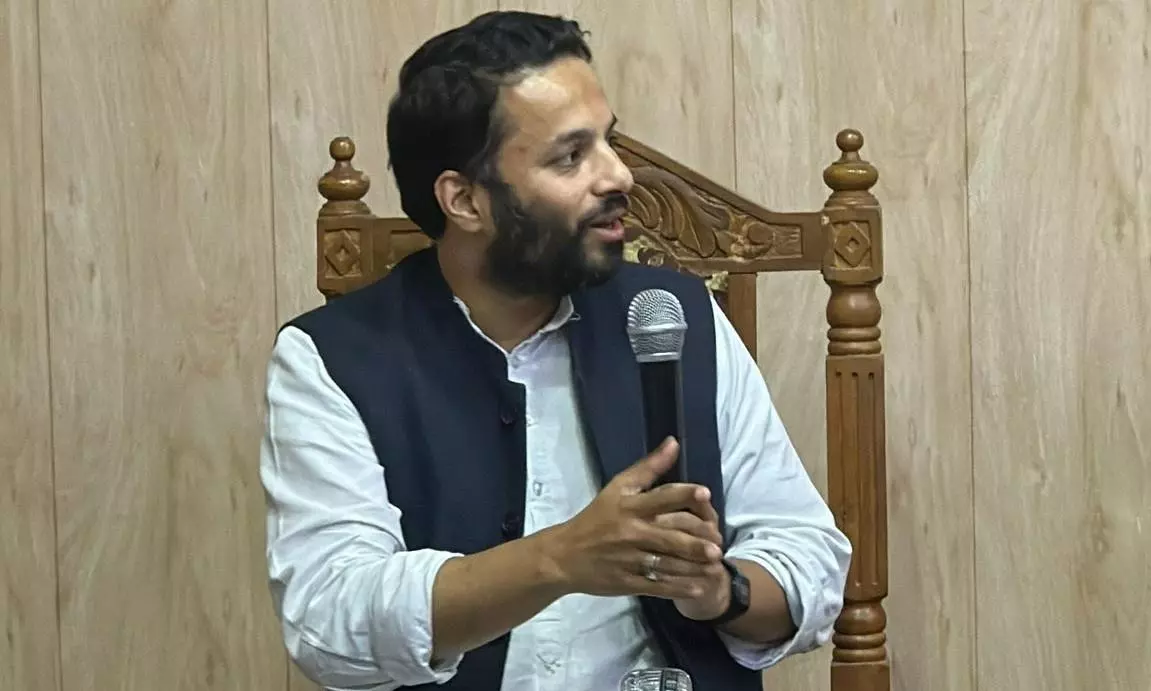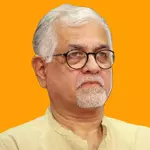
- Home
- India
- World
- Premium
- THE FEDERAL SPECIAL
- Analysis
- States
- Perspective
- Videos
- Sports
- Education
- Entertainment
- Elections
- Features
- Health
- Business
- Series
- In memoriam: Sheikh Mujibur Rahman
- Bishnoi's Men
- NEET TANGLE
- Economy Series
- Earth Day
- Kashmir’s Frozen Turbulence
- India@75
- The legend of Ramjanmabhoomi
- Liberalisation@30
- How to tame a dragon
- Celebrating biodiversity
- Farm Matters
- 50 days of solitude
- Bringing Migrants Home
- Budget 2020
- Jharkhand Votes
- The Federal Investigates
- The Federal Impact
- Vanishing Sand
- Gandhi @ 150
- Andhra Today
- Field report
- Operation Gulmarg
- Pandemic @1 Mn in India
- The Federal Year-End
- The Zero Year
- Science
- Brand studio
- Newsletter
- Elections 2024
- Events
- Home
- IndiaIndia
- World
- Analysis
- StatesStates
- PerspectivePerspective
- VideosVideos
- Sports
- Education
- Entertainment
- ElectionsElections
- Features
- Health
- BusinessBusiness
- Premium
- Loading...
Premium - Events

If a dictionary could do the trick, the judges could have used it themselves without telling the cops; also, a sentence means more than the sum total of its words
The case against Ashoka University Assistant Professor Ali Khan Mahmudabad, on his two Facebook posts regarding Operation Sindoor, appears to have taken a curious turn.
The Supreme Court has criticised the Special Investigation Team (SIT) set up for the investigation for going beyond its remit by repeatedly questioning Mahmudabad, seizing his electronic devices, and delving into his foreign visits over the past 10 years.
A Bench of Justices Surya Kant and Joymala Bagchi warned the SIT that it is "misdirecting itself" and should confine its investigation to the "contents of the two social media posts" instead of launching a "roving inquiry".
“You don’t require him. You require a dictionary,” Justice Kant quipped while making clear that Mahmudabad need not be summoned again. The court also said that it had only restrained the professor from writing on topics that were sub-judice, and he was free to write or express his opinion on other issues.
SC backtracking
On the face of it, it looks like the Supreme Court is backtracking somewhat from the strident position that it had assumed on May 21 during the hearing for interim bail. Though interim bail was granted, Justice Kant was very critical of Mahmudabad’s posts, observing that he was engaging in “dog whistling” that can hurt the sentiments “on the other side” and that he could have used "polite, respectful and neutral language".
One feels genuinely sorry for the venerable judges because the latest observations suggest that they are trying to extricate themselves from a tight spot of their own making.
Noting that some of the words in the posts had a “double meaning”, Justice Kant also remarked that Mahmudabad was seeking “cheap popularity” during a time of national crisis.
The Bench then directed the Haryana Director General of Police (DGP) to constitute an SIT of three IPS officers to probe into the allegations and for “holistically understanding the complexity of the phraseology employed and for proper appreciation of some of the expressions used in these two online posts”.
Also read | Why the right wing detests Prof Ali Khan Mahmudabad and his ilk
Corrective gesture
One feels genuinely sorry for the venerable judges because the latest observations suggest that they are trying to extricate themselves from a tight spot of their own making. They appear to be a far cry from the "breathing fire" tone of observations during the hearing for interim bail and even a veiled acknowledgement of their own error of judgment in entrusting the investigation to an SIT of police officers.
Despite the apparent corrective gesture, what still escapes understanding is how the judges expected a team of police officers with no specialised linguistic expertise to analyse a text for hidden meanings and authorial intention.
If indeed the judges were so concerned with what was "really being said" in the posts, they could have easily resorted to expert testimony.
Did they expect that they would dissect and interpret the passages as a linguist or a literary critic might and come out with a truthful rendition of what the texts "really said"? Or, were they hoping for a modern day Abhinavagupta or a Noam Chomsky, lurking unknown behind the uniforms, who could decipher the dhvani or the "deep structural connotations" of the posts?
How realistic is that?
And, even if these police officers were to come up with an interpretation, how reliable and authoritative can that be, when their job is not linguistic analysis but maintenance of law and order?
Also read: Politicians, lawyers, academics speak out against Ashoka University teacher’s arrest
Why blame them?
To resort to an analogy, it is like entrusting a set of carpenters to assess the quality and effectiveness of a medical diagnosis software and then to admonish them when they try to inspect the joints and polish of the box in which it comes, or even the build of the table on which the computer sits.
How can one blame them? That's what they are trained to do, that's what they know. Then, to advise them that they should be referring to a book on software coding is somewhat of a tall order.
Unfortunately, that is what the venerable judges did in entrusting police officers to investigate into the meaning and significance of the posts when they themselves could have easily resolved the issue by reading the posts without favour or bias.
Also read | Was Allahbadia row whipped up to hasten YouTube content regulation?
Getting the prof right
If all that was required was referring to a dictionary, the judges themselves could have easily done so without troubling the poor police officers. However, that way too confusion lies because before long the lordships will come to realise that the total meaning of a sentence is not the sum total of the meanings of its individual words. And, what then?
If indeed the judges were so concerned with what was "really being said" in the posts, they could have easily resorted to expert testimony.
Even if the so-called "tukde tukde gangs" of JNU professors are to be excluded, one is sure that there is no dearth of people in the national capital with a reasonable grasp of the English language, who could have helped their lordships in trying to decipher Mahmudabad's writing.
Passing the buck
This is where one suspects that the court is lurching from one absurdity to another, in evading its primary responsibility. No judge represents himself or any set of opinions out there in the public domain; his responsibility is to ensure that subjective likes and dislikes or the sway of powerful ideologies do not intrude upon his consideration of any matter.
He is by oath enjoined to "perform the duties of his office without fear or favour, affection or ill will" and to "uphold the Constitution and the laws."
In this particular instance, the responsibility of the court is to diligently follow constitutional provisions on freedom of speech and previous judgments on the issue, or in other words, law and established precedent. Those provisions and precedents are crystal clear.
Watch | Bail to Mahmudabad: 'SC remarks could have chilling effect on free expression'
What the law says
Under Article 19(2) of the Constitution, the State may impose restrictions on free speech only on eight specific grounds: the sovereignty and integrity of India, the security of the State, friendly relations with foreign states, public order, decency or morality, contempt of court, defamation, and incitement to an offence.
The Supreme Court has repeatedly held that such restrictions cannot be arbitrary or excessive, but must be reasonable, proportionate, and directly connected to one of these eight grounds. As succinctly put by the court in a very recent case, "The effect of the spoken or written words cannot be judged on the basis of the standards of people who always have a sense of insecurity or of those who always perceive criticism as a threat to their power or position." (Imran Pratapgadhi vs State Of Gujarat, 2025).
In other words, individuals cannot be penalised merely for expressing views that deviate from mainstream or dominant opinions, let alone for "double meanings" or "dog whistlings".
Cautionary instance
One can only hope that the court stops passing the buck and returns to its avowed responsibility of being the protector of the Constitution and the rights therein.
It would certainly be of immense service in ensuring not only that the basic tenets of democracy are safe but also that the courts do not tie themselves into embarrassing knots of their own making.
Furthermore, one also hopes that this becomes a cautionary instance of how even courts should be very circumspect when it comes to writings of scholars and intellectuals.
(The Federal seeks to present views and opinions from all sides of the spectrum. The information, ideas or opinions in the articles are of the author and do not necessarily reflect the views of The Federal.)


